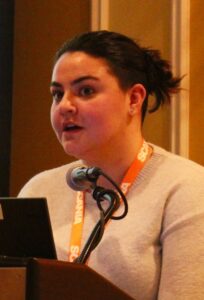Gabrielle Hillyer: Seeking solutions to strengthen coastal economies
This doctoral student in ecology and environmental sciences works to support and connect coastal communities

What problem/s are you working to solve?
I am working to solve coastal resilience issues related to Maine’s shellfish fishery. I’m focusing primarily on how community-led science can lead to adaptive and localized solutions to issues such as water quality, equity and power dynamics, and others.
What progress are you making toward solutions?
Currently I work as the project coordinator for the Maine Shellfish Learning Network, an organization led by Bridie McGreavy. I’m working closely with Anthony Sutton as well. This network is focused on developing and supporting leadership, equitability and engaged research throughout the shellfish industry. Specifically, I’m working on a water-quality decision support tool to help foster co-management and localized science, as well as developing an archival website which will mesh cultural, economic, and social information around shellfish harvesting in Maine.
How could your findings contribute to a sustainable future in Maine and beyond?
My findings focus on improving communication between multiple institutions and communities across Maine by identifying specific bottlenecks in sharing information and opening up new pathways to cross boundaries. In this way, environmental managers and communities can develop new ways of not only communicating and sharing information, but creating more adaptive and flexible management together, which can lead to a more sustainable shellfish fishery.
Why did you get involved with the Mitchell Center Strengthening Coastal Economies project?
I initially became involved through my advisor, Bridie McGreavy, who broadened my understanding of resilience and adaptive capacity. These themes align well with this project, which works to solve complex problems around economic development and environmental conservation.
What do you like best about working on an interdisciplinary team? What is most challenging?
I love working on an interdisciplinary team. I find that having such a team is crucial to solve today’s “wicked” problems, which require having multiple backgrounds, knowledge bases, and specialties. In the current status of the world, it also is immensely comforting to have multiple brains working together to bounce ideas off of. It is challenging to maintain communication throughout a team at times, particularly now when remote conversations are much more stagnant. As with any team, there is also a bit of relationship-building across personalities and backgrounds. But overall, the benefits of having an interdisciplinary team far outweigh any challenges.
What do you find rewarding about collaborating with stakeholders? Most challenging?
Stakeholders provide a knowledge base and reality check that otherwise just wouldn’t be possible in any other research field. Engaging with stakeholders in an equitable space also allows for more applicable research. It can be challenging to maintain communication, as well as create an equitable space where an entire community can engage with the scientific process.
What sustains you?
I work from a service space. So, what sustains me is helping to solve problems, serving communities, and seeing my work influence new management decisions. It’s a lot of pressure, but also motivating. I find that my stakeholder collaborators give me direction and encouragement as well.
Where do you hope to be in five years?
In five years, I hope to still be working with stakeholders and communities to the greatest extent possible. I’ve fallen in love with Maine’s shellfish fishery, so working with communities around water quality and coastal management issues is the goal.
Learn more about Gabby’s work: Drifting with the tides: A new beginning
